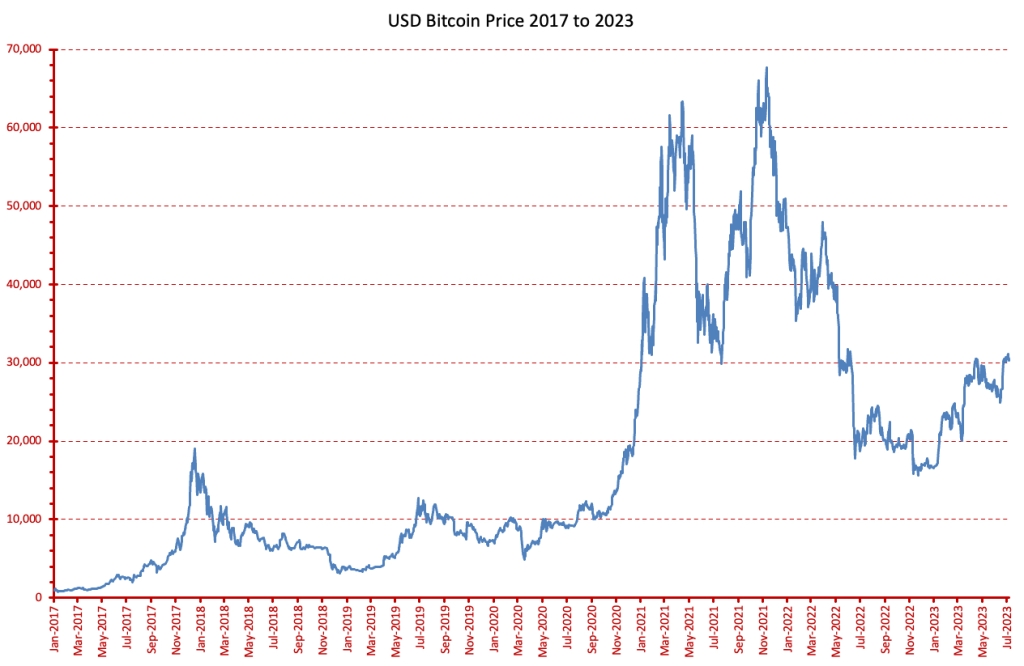10 Reasons Why Investing in Cryptocurrency May Be Unwise
Introduction
Cryptocurrency has received significant attention and popularity in recent years, with some achieving remarkable returns. However, it is essential to approach this “investment” with caution, considering the inherent risks involved. As readers of TMQ will be aware, cryptocurrency is much more a speculative play – some could say a gamble – than a traditional investment in bonds or listed shares. In this discussion, we will examine ten reasons why involvement with cryptocurrency may be unwise, drawing insights from Modern Portfolio Theory and the principles of prudent investing.
1. Volatility and Speculative Nature
Cryptocurrencies, such as Bitcoin and Ethereum, are notorious for their extreme price volatility. The substantial price fluctuations can create opportunities for gains, but they also expose investors to significant risks. This extreme volatility and speculative nature make cryptocurrencies unsuitable for conservative or risk-averse investors. The chart below shows how volatile the USD price of bitcoin has been since 2017.

2. Lack of Intrinsic Value
Unlike traditional investment assets, cryptocurrencies lack intrinsic value, which means there’s nothing backing their price. Shares, bonds and commodities have a tangible underlying asset or cashflow which accounts for their value. With cryptocurrencies, their value is primarily derived from market demand and speculation, making it difficult to assess their true worth. Without underlying assets or cash flows, valuing cryptocurrencies becomes challenging (to say the least), making it a less predictable investment.
3. Regulatory Uncertainty
The regulatory landscape surrounding cryptocurrencies is still evolving, which introduces considerable uncertainty. Governments and regulatory bodies worldwide are grappling with how to classify and regulate cryptocurrencies, which can lead to sudden changes in rules and potential restrictions on trading or ownership. This uncertainty can significantly affect the value of cryptocurrencies.
4. Cybersecurity Risks
Cryptocurrencies are highly vulnerable to cybersecurity threats, including hacking, fraud and theft. Numerous instances of major cryptocurrency exchanges being hacked and digital wallets being compromised have raised concerns about the security of these assets. Investors must consider the increased risk of losing their entire investment due to security breaches.
5. Lack of Diversification
Modern Portfolio Theory emphasises the importance of diversification to reduce risk. While cryptocurrencies may offer potential returns, allocating a significant portion of one’s investment portfolio solely to this asset class increases concentration risk. Diversifying across various traditional asset classes, such as shares and bonds, is generally considered a more prudent approach.
6. Lack of Regulation and Investor Protection
Compared to traditional financial markets, the cryptocurrency industry operates with minimal regulatory oversight and investor protection mechanisms. This absence of safeguards exposes investors to higher risks of fraud, market manipulation and scams. In case of any disputes or fraudulent activities, recovering investments or seeking legal remedies can be challenging. With ASX-listed shares an investor is sure of their ownership of the asset; it’s most often registered in their own name. With crypto assets ownership is often not certain as the cryptocurrency may be held by a third party. This can increase risk in cases of fraud or cashflow crises. Some notable cases of crypto rug pulls underline the uncertain nature of the ownership of these instruments.
Need we mention FTX?

7. Lack of Historical Data and Established Track Record
Cryptocurrencies, especially those with shorter market histories, lack the extensive data and established track records necessary for informed decision-making. Traditional investments often rely on historical performance indicators, such as earnings, dividends and economic trends. In contrast, cryptocurrencies may experience drastic price swings based on sentiment, market hype or even social media trends.
8. Market Manipulation
The cryptocurrency market is relatively small and illiquid compared to traditional financial markets. This illiquidity, coupled with the presence of large-scale investors and limited regulatory oversight, leaves the door open for market manipulation. Pump-and-dump schemes, wash trading and other fraudulent activities can artificially inflate prices, leading to unsuspecting investors suffering substantial losses.
9. Environmental Concerns
The mining process of certain cryptocurrencies, such as Bitcoin, requires substantial computational power and energy consumption. This energy-intensive process contributes to environmental concerns, particularly with regard to carbon emissions. Some estimates say that Bitcoin mining releases 62 million tonnes of carbon dioxide each year. Investors concerned about sustainability and socially responsible investing may find these environmental impacts incompatible with their investment philosophy.
10. Emotional Decision-Making
Cryptocurrency investments are often influenced by emotions, such as fear of missing out (FOMO), the allure of quick profits or the desire to just sound cool at parties. Emotional decision-making can lead to impulsive investment choices, speculative behaviour and a tendency to chase trends. Investors are advised to approach investment decisions based on rational analysis, long-term goals and a diversified strategy.
Conclusion
While cryptocurrencies have the potential for significant returns, they also carry substantial risks that prudent investors should consider. Modern Portfolio Theory encourages diversification, valuation based on intrinsic worth and diligent risk management. By understanding the limitations and uncertainties associated with cryptocurrencies, investors can make informed decisions and construct well-balanced portfolios that align with their risk tolerance and long-term financial goals. Crypto is effectively a gamble, rather than an investment. If you’re considering dabbling, understanding these risks is vital to avoid any nasty surprises.

